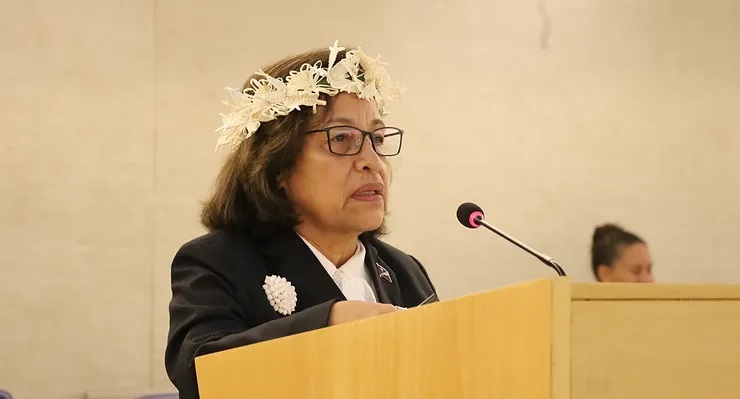Marshall Islands President Dr Hilda Heine brought an urgent appeal to the Human Rights Council in Geneva to highlight the profound human rights challenges endured by the Marshallese for nearly 80 years as a result of nuclear weapons testing and the ongoing climate crisis.
“Despite these wrongs, for almost 80 years, we have not received an official apology. There has been no meaningful reconciliation, and we continue to seek redress,” Heine said, speaking at the 57th session of the Human Rights Council at the Palais des Nations on 27 September.
“We must address the human rights violations of the past and the generational implications that persist today,” she added.
She reiterated the need for accountability and redress, urging the Human Rights Council and member states to recognise the suffering endured by the Marshallese people and to learn from history.
The Marshall Islands was subjected to 67 nuclear and thermonuclear weapons tests between 1946 and 1958, while it was under a United Nations Trusteeship, administered by the United States of America.
Heine said these tests poisoned their environment and devastated the health of their people. “The Marshallese people were misled, forcibly displaced and subjected to scientific experimentation without their consent,” she added.
Heine said she wants to “elevate awareness of the struggles my people have endured and to call for urgent action from a world grappling with the climate crisis.” She emphasised the urgency of addressing these issues.
Heine delivered a similar message at the United Nations’ General Assembly a week earlier.
In Geneva, Heine called for an ambitious new climate finance goal under the United Nations Framework Convention on Climate Change and urged the Group of 20—a group of nations that addresses global economic issues—to beef up their national moves to transition away from fossil fuels.
‘I am a firm believer in the important work of this Council in promoting and protecting human rights. It is, therefore, my sincere hope that this Council will continue to keep the human rights of the Marshallese people at heart, when considering the matters that we bring before it for consideration,” she said.
Heine announced two landmark resolutions for the HRC’s consideration at its session. Both resolutions aim to renew the mandate of the Special Rapporteur on the promotion and protection of human rights in the context of climate change and to continue the technical assistance and capacity-building to address the Marshall Islands’ nuclear legacy.
The Marshall Islands is joined by the Bahamas, the European Union, Fiji, Panama, Paraguay and Sudan in presenting the resolution on the mandate of the Special Rapporteur on climate change. She noted that this cross-regionality only means that climate change affects all nations.
The Marshall Islands is also joined by the Federated States of Micronesia, Fiji, Kiribati, Nauru, Samoa and Vanuatu in presenting the resolution on technical assistance and capacity-building for the Marshall Islands to address its nuclear legacy.
Also, despite the Marshallese people’s objections and a petition to the UN Trusteeship Council for these nuclear weapons tests to stop, Heine said they were allowed to continue, and they are now subjected to the long-term consequences of that decision.
“We have a collective responsibility to ensure that the human rights challenges and suffering that our people have endured and continue to endure are never again inflicted on others for the sake of these abominable weapons,” she added.
She said the Marshall Islands remains hopeful of one day achieving meaningful reconciliation with the United Nations and the United States of America on the Marshall Islands’ nuclear legacy. That, she said, will allow everyone “to genuinely deal with the past, come to terms with uncomfortable truths, devise solutions, restore the trust that was broken, and build forward together.”
Heine also expressed hope for the Marshall Islands to rejoin the Council for the 2025-2027 term. “We count on the support of all member states at the elections in New York in a few weeks’ time,” she added.














